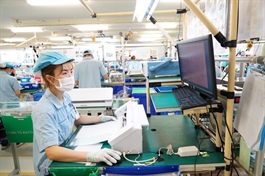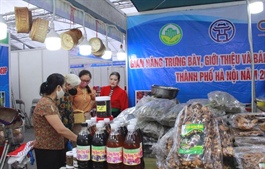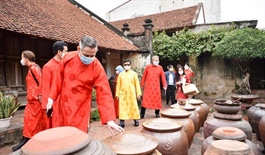Agricultural sector pushes green growth in 2021-30 action plan
Agricultural sector pushes green growth in 2021-30 action plan
The Ministry of Agriculture and Rural Development has recently approved an action plan for implementing the goals, tasks and solutions of the National Strategy on Green Growth for the period of 2021-30, and vision to 2050.

Accordingly, agriculture will be steered towards sustainable, ecological, organic, circular development and low carbon emissions in order to improve growth quality, increase added value and competitiveness, reduce environmental pollution in agricultural production and rural areas, and use effectively and efficiently energy and natural resources towards a carbon-neutral economy by 2050.
Specifically, the GDP growth rate of the agricultural sector is set to reach 2.5-3% per year.
The agriculture sector will focus on improving efficiency in the use and protection of land, water, aquatic resources, forests, and biodiversity conservation. Forest coverage rates will be maintained at 42% with one million hectares receiving sustainable forest management certificates.
The sector has set a target that the proportion of organic fertiliser products and biological plant protection substances of the total fertiliser and plant protection substances produced and consumed will top 30%, and at least 30% of total crop area will apply advanced and water-saving irrigation methods.
Along with converting 300,000 hectares of rice land to planting other crops with higher economic and environmental efficiency, the agricultural sector strives to expand the area of organic cultivated land to over 2% of the total area while the percentage of organic livestock products is to account for about 2-3% of the total livestock products produced in the country.
At the same time, the application of good agricultural production practices will be expanded to improve quality, added value and competitiveness as well as reduce greenhouse gas emissions in agricultural production.
The process of new rural development must be accelerated to meet green and sustainable growth goals and form a lifestyle in harmony with the environment and nature.
To achieve the above goals, the cultivation sector will change the crop structure in line with market advantages and needs, adapting to climate change in each region so as to form specialised and large-scale commodity production areas.
The sector will promote the application of advanced production processes to reduce the use of fertilisers and chemical pesticides that cause environmental pollution and the degradation of arable land and greenhouse gas emissions.
For the livestock industry, small-scale production will be switched to large-scale farms to form key livestock production areas associated with environmental protection, biosecurity and technology application.
All livestock production establishments, slaughterhouses, and livestock product processing establishments must have appropriate environmental control solutions to ensure that they do not cause environmental pollution and effectively use livestock waste sources for the demands of cultivation, aquaculture, insect breeding and renewable energy production.
For fisheries, the industry has to synchronously implement solutions to protect and develop sustainable aquatic resources in accordance with international standards and practices as well as raise new aquaculture species with high efficiency, good disease resistance and adaptability to climatic conditions.
The industry will adjust the intensity and structure of fishing to ensure efficiency and sustainability associated with biodiversity conservation.
In forestry production, it is necessary to expand concentrated planting material areas, restore natural forests, develop agro-forestry and non-timber forest products in the direction of commodity production.
In addition, the sector will focus on expanding forest areas certified for sustainable management, maximising forest environmental services to generate revenue as well as exploiting potential new services such as eco-tourism, carbon sequestration and storage services.
In the processing of agricultural, forestry and fishery products, environmental pollution must be addressed.
Preserving and developing traditional craft villages, linking economic activities with tourism services, preserving traditional culture, and creating jobs and incomes will be promoted.
Businesses and households in craft villages and production establishments in rural areas will be given assistance to invest in technology and equipment innovation to improve energy efficiency and reduce pollution in production, and develop OCOP (One Commune One Product Programme) in the direction of a circular economy.
The Ministry of Agricultural and Rural Development will continue to research, review and complete the national set of criteria for new rural areas at all levels to meet the requirements of green and sustainable growth.
The ministry will also complete mechanisms and policies of promoting agricultural green growth and enhances human resource training for green and ecological agriculture, digital transformation and advanced technology applications serving the effective use of natural resources and environment protection.
In order to have investment capital for the green growth goals, the ministry focuses on mobilising social resources, especially from businesses, and strengthening international co-operation to call for financial support and technology transfer in order to make Vietnam’s agriculture a model for green, low-carbon, safe agricultural products, and improve competitiveness in the global agricultural chain, contributing to reducing greenhouse gas emissions, especially methane in crop production, animal husbandry and deforestation.






















